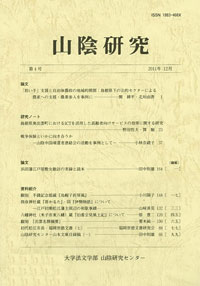島根大学法文学部山陰研究センター
ISSN:1883-468X

ダウンロード数 : ? 件
この文献の参照には次のURLをご利用ください : https://ir.lib.shimane-u.ac.jp/6828
山陰研究 1
2008-12-31 発行
経営所得安定対策下における集落営農の展開 : 島根県における集落型農業法人連携を中心に
Development of village farming under the agricultural management and income stability policy
谷口 憲治
島根大学生物資源科学部
ファイル
内容記述(抄録等)
近年、わが国の農業政策は、従来の全農家対象の農業経営支援策から面積要件により政策対象農家を限定するものとなった。こうした農業政策の転換により政策対象となった集落営農は、政策という外部要因の影響を受けるとともに、それへの経営的対応という内部要因による対応により具体的展開がなされている。本稿では、こうした集落営農の新たな展開について理論的実証的考察を行い、次のことが明確となった。第一に、集落営農展開論については、近年その影響が大きくなっている外部要因としての政策との関連、集落営農の他組織との連携での展開論について指摘した。第二に、第一に関する外的要因の事象として集落営農組織数の全国地方別展開に特徴が見られることを示した。集落営農を政策対象とされるようになって以来、集落営農の先行地方である北陸、近畿、中国に対して東北、九州の増加が顕著となり、その内容も小規模経営の全集落的共同化から特定農家への経営移譲対応という性格を持つものであることを示した。第三に、第一の内部要因の事象として中国地方島根県にみられる集落営農と他組織との多様な連携形態を明らかにした。この内的要因の東北、九州についての考察は、今後の課題であるが、政策対象が差別化される農業政策が進展する中で外部要因としての政策展開と内部要因の経営展開の相互連関的考察が集落営農展開論において不可避となると思われる。
In recent years Japanese agricultural policy has changed over and the policy objects have been limited by farm management scales. In this paper I considered how the village farming that became one of the policy objects changed by the new policy. As a result it became clear as follows.
1) When the village farming has the suitable condition of the policy, it develops and changes by the policy as an outside factor.
2) By an above-mentioned thing there are many differences among the village farmings. Especially in Tohoku region where exist many big scale farmers by comparison with other regions, the number of village farmings increased more rapidly than in other regions but the management tends to concentrate to the particular farmers.
3) In Shimane prefecture where many small farmers is not in suitable condition for the policy, the number of village farmings is stagnant but the cooperation between many farmers and organizations developed various forms in this area. The main forms are three types that are a network type, a part machine used type and a work trust type.
1) When the village farming has the suitable condition of the policy, it develops and changes by the policy as an outside factor.
2) By an above-mentioned thing there are many differences among the village farmings. Especially in Tohoku region where exist many big scale farmers by comparison with other regions, the number of village farmings increased more rapidly than in other regions but the management tends to concentrate to the particular farmers.
3) In Shimane prefecture where many small farmers is not in suitable condition for the policy, the number of village farmings is stagnant but the cooperation between many farmers and organizations developed various forms in this area. The main forms are three types that are a network type, a part machine used type and a work trust type.
Other Article
